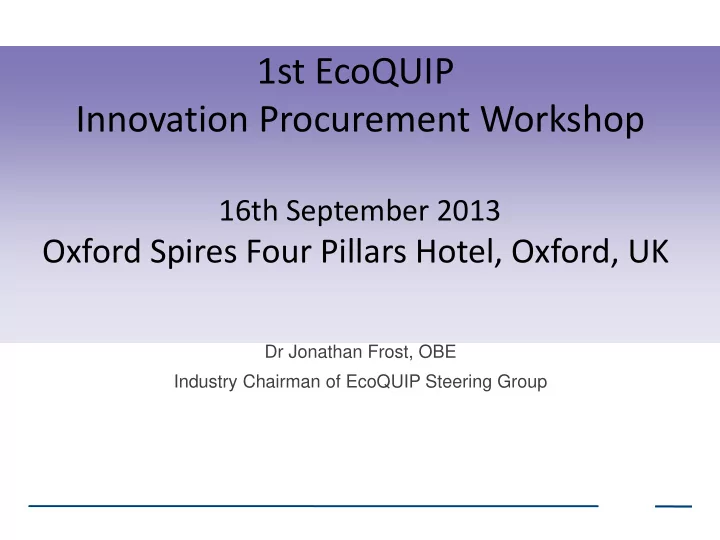

1st EcoQUIP Innovation Procurement Workshop 16th September 2013 Oxford Spires Four Pillars Hotel, Oxford, UK Dr Jonathan Frost, OBE Industry Chairman of EcoQUIP Steering Group
Challenging times – a role for innovation Rapid change, aging populations and increasing expectations Financial and efficiency challenges Increasing cost of energy and carbon Progressively more demanding carbon reduction targets and environmental regulation. The present is unsustainable – it costs too much and doesn’t deliver what we want. So we need new goods, services and ways of doing things that are cheaper, better and which solve multiple problems Innovation is needed to enable healthcare services to adapt to changing circumstances and prepare for the future.
Innovation – its nature and its causes Innovation – a way of meeting an unmet need that isn’t being met by existing products or services In some cases a new product or service seems to “create” the unmet need (who knew we needed smart phones or Costa coffee before they existed). This has created some great businesses and even more famous myths. The desire to promote this type of innovation has led to support for pushing innovation from the supply side by eg – public funding of R&D, Another, altogether more reliable, way to promote innovation is for those with the unmet need to realise it and then tell possible suppliers that they would buy it if it was available. Suppliers will then innovate and invest to met this unmet need. This is the argument for demand side pull for innovation. Demand side pull can be achieved by regulation or procurement – procurement is the most flexible way. Supply chain management is the tool by which procurement achieves its aims
Barriers to low carbon innovation Procurement practice appears to be the most important barrier P1 -Procurement practice for healthcare facilities is still biased towards initial capital investment cost rather than whole life costing P2 - Political targets to reduce CO 2 emissions from buildings are not yet translated into mandatory procurement criteria P3 - There is a lack of pre-procurement dialogue on low carbon options between buyers and the supply chain P4 - Procurement specifications do not explicitly encourage low carbon outcomes
Healthcare innovation Healthcare organisations have considerable (potential) power to influence the supply chain and drive innovation. The Healthcare sector is ideal as a ‘ lead market ’ because a solution for one hospital is likely to be a solution for most hospitals. Despite these advantages there is considerable dissatisfaction about the ability of Healthcare organisations to use supply chain management to harness the power of innovation to meet their goals. The way we go about procuring this lies at the root of this dissatisfaction. There are many pressures to simply ask for the cheapest well proven product the market has to offer. This destroys the incentive for innovative suppliers to innovate – which is fine if we don’t need innovation….. But we do need innovation. Later we shall hear of examples in which buyers articulating their unmet needs and supporting the supply chain to deliver has worked brilliantly well. But the question remains why are these examples not the norm? The challenge facing this workshop is to find the right ways set free the potential of procurement to drive innovation
The Opportunity It is a particularly opportune moment to explore the ways in which our buying decisions can help to create the world we want (rather than lock in the world we don’t) The EU Commission has been trying to promote the use of demand driven innovation but is struggling to find the most powerful ways forward. It has supported programs such as Ecoquip in the hope that they can show the way forward for programs such as Horizon 2020, structural funds and regional development funds. By coming together at his workshop to find ways to help ourselves we can also help the entire European economy become more innovative and more successful
Todays Agenda 13:30 Case Examples of Innovation Procurement in Action Gaynor Whyles, EcoQUIP Project Coordinator, JERA Consulting, UK Marcel Bot, Managing Director, IMS Medical, Netherlands Marcin Kautsch, EcoQUIP Coordinator, Poland 14:15 Perspectives on innovation from the supply side Andrew Smith, Head of Sales & Customer Relations, Eykona Medical Ltd, UK Mehrdad Mahdjoubi, Founder and CEO, Orbital Systems, Sweden Felipe Carrasco Torres, Technical Director, ATEVAL, Spain COFFEE BREAK (15:00) 15:30 Background Research on Priorities and Opportunities for Innovation Procurement Angus Hunter, EcoQUIP Project Manager, Optimat 16:00 Break-Out Groups Discussion on potential Joint Actions 17:00 Panel Discussion on Priorities for Joint Action Plenary discussion on Joint Actions Panel Members: Juan Manuel Garrido Moreno (Spain); Marcin Kautsch (Poland); Joram Nauta (Netherlands); Ville Valovirta (Finland); Gaynor Whyles (UK) 17:45 Chairman’s Conclusions
Recommend
More recommend